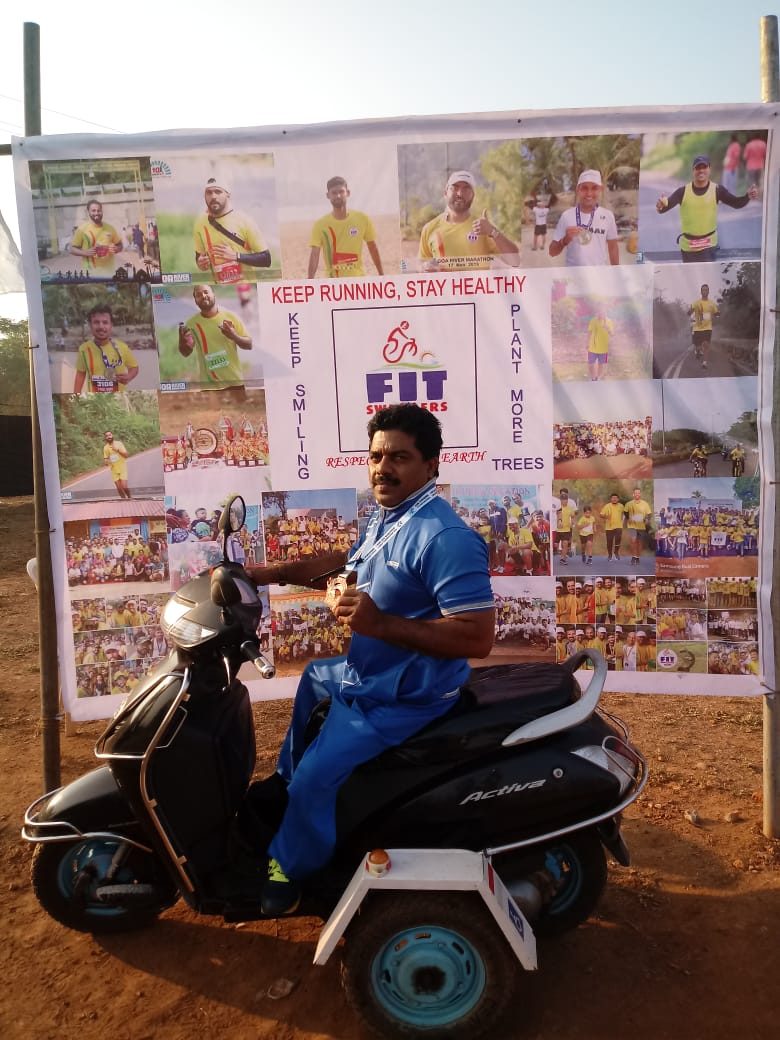Xtraspecial

Santosh Mayekar
Though it has been widely claimed that polio has been eradicated from India, one finds many cases of persons affected with polio in the country, and also Goa. Santosh Mayekar, now 49, was affected with polio when he was one year old. He recalls his childhood being carried to school by his sister, brother and father. “My sister carried me on her back to school till I was in primary, from class I-IV. Then my brother took me to school on his bicycle from V-VI and from VII onwards my father dropped and picked me from school on a daily basis. I owe so much to my family that has taken a lot of pain for my schooling – especially because my father used to work on daily basis, and yet, having understood the importance of education, he saw to it that I completed it till he was alive,” shares a humble Santosh who, unfortunately, lost the sole breadwinner of his family too soon. Santosh’s father expired at an early age, leaving behind the responsibility of supporting a family of three sons and two daughters, on his wife who sold bananas for a living.
“My father used to drop him to school in the morning before going to work and pick me up in the afternoon. After his demise, I walked with the help of callipers and travelled by bus without anyone accompanying me. My mother used to sell bananas in the Mapusa market. I lost my elder brother too. The family lived together,” states Santosh who passed SSC, after which he did his XI and XII from Open School.
“I got a job at the department of Art and Culture in February 2014. But before this job I worked as a librarian at the local Panchayat. Then I worked as a peon in RDA Panaji for two years. I purchased a two-wheeler with a side wheel and began travelling independently,” says Santosh who joined RDA as a door keeper but was handed over the responsibility of LDC with computer work. He got training for half day in the directorate of Art and Culture for five years. He worked in this department for 11 years before he shifted to the Central Library on the membership issuing counter.
Santosh got married in 2007. Speaking of his supportive wife, he smiles. “Deciding to marry a person with polio is not that easy. I was independently doing all home chores including kitchen work, setting roof tiles, ironing my clothes, breaking coconuts etc. So, Ratan my wife did not have a second thought before she said yes to our marriage.”
Lucky to have a supportive family, mother, wife and now his son Datta, who studies in higher secondary, Santosh’s life is more or less settled and sorted. He began actively participating in sports in 2015 after Vishant Nagvekar coaxed and encouraged him to play saying, “Let’s do something and show the world.”
So Santosh began playing outdoor games. He played cricket last year and also participated in the Marathon in 2024. There were marathons earlier, but persons with disabilities were not allowed to participate, he claims and adds that the Purple Fest opened up new spheres for PwDs. “We did Musal dance, albeit using wheelchairs, and shone. Everyone appreciated us. It’s been two years that we are participating in the Purple Fest and everyone gets a chance to showcase his/her talent,” he asserts.
Today, Santosh is thankful to many people in his life – friends, family and colleagues at work – Sushant Tandel, the curator of the Central Library who always extends his support and his colleagues Vijay Pawaskar, Prashant Phadte, the three floor in-charges – Maria, Aljira and Vasanti who are kind and caring. “My cousins Prakash Mayekar and Gopal Mayekar are there whenever I need,” says Santosh who also remembers his nephew Rama Dhavaskar who is in the army and posted in Kashmir. “It was Rama who instilled confidence in me. There are others Sachin Mayekar, Pritam Phadte, Madhu Harmalkar who helped me in multiple ways. His mother was his Guru as she threw the first ball towards him and motivated him to play.
Adopting a philosophy for life, that ‘Haar mei bhi jeet hai – there’s winning in every failure. One can learn from the experience. Winning is not important. One can win or lose. But one learns the importance of winning only after he loses. So it’s a part and parcel of life. The show must go on, irrespective of the end result. It’s a learning process – looking how others play the game, and review. Today, many sports trophies and rewards adorn his desk of both indoor and outdoor games – table tennis, badminton, cricket, marathons...